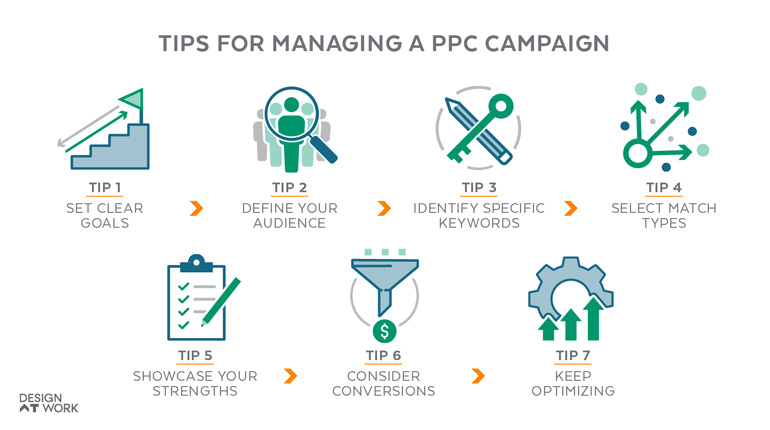Digital Marketing Insights for
Launching Paid Ads.

So, you’re ready to get started with PPC campaign management. Great! But, where do you start? Pay-per-click — or PPC, for short — ads are a type of paid digital advertising option that allows you to hone in on your target audience. When used as a part of your overall digital marketing strategy, which can include search engine optimization (SEO) and boosted social media posts, PPC ads offer you the opportunity to get more digital face time in front of potential customers who are searching for just what your company offers. These ads can be used to promote your business on Google and other search engines, showcasing them at the top of search results for related phrases and queries.
What are the Benefits of a PPC Campaign?
The beauty of a PPC campaign is that you only pay when someone clicks on your ad. This means that you can focus your ad spend on potential customers that are searching for relevant topics. By focusing on users that show intent, you’re more likely to reach those who are interested in your business’ goods or services.
You also have control over the budget, keywords you want to focus on and those you don’t — called negative keywords — and access to a wide range of data and analytics tools to help you optimize your campaigns over time.

Tips for Managing
a PPC Campaign.

Okay, so now you’re ready to launch a PPC digital marketing campaign. Here are some tips to help you get set up and start watching the clicks roll in.
Tip 1: Set Clear Goals
The very first step in the process is to set your goals. Make sure that these are clear, measurable goals that you can track along the way. This will not only help you evaluate the success of your campaign and adjust as needed along the way but will help you set up your ads correctly from the start.
Tip 2: Define Your Audience
First up, what geographical areas are you trying to reach? Local businesses will likely want to focus on a specific city or even ZIP code, while large-scale businesses with multiple locations can select states, regions or even entire countries.
Tip 3: Identify Specific Keywords
This is the time to think like your customers. Put yourself in their shoes. What search terms would they type into Google to find what you offer? Identify specific, detailed keywords that will help your ad reach the right people.
Tip 4: Select Match Types
Now that you have the detailed keywords down, zoom out just a little bit. You can choose match types for your keywords, which will indicate how closely the keyword needs to match the Google query. “Broad match” will help target people searching about the same general topic, while “exact match” targets the specific word or phrase you have identified.
Tip 5: Showcase Your Strengths
When it comes time to write your ads, be sure to incorporate the keywords you’ve selected as you showcase your company’s unique selling points. You’ll also want to include a call to action (CTA) to help give customers a clear path to follow. For example, do you want to them to sign up for a demo, book a 1:1 session or call your sales team?
Tip 6: Consider Conversions
Once all the pieces are in place — from the written content to the daily budget — it’s time to launch your campaign. As the ad runs, you’ll also want to consider your conversion rate — meaning how many marketing dollars are spent for one customer to convert. This will help you understand your return on investment (ROI) during the campaign.
Tip 7: Keep Optimizing
Track the data analytics to see how your ad is performing. Many PPC ad platforms, such as Google Ads, will provide suggestions for optimizing your ads and increasing overall performance. This is a normal part of the process and helps you zero in on the most qualified audience.
As a beginning, the acronyms and jargon related to paid search marketing terminology can seem intimidating but taking these tips into consideration can help you start strong — and stay on track. Once these key points have been established, you will have a great base for beginning a paid search marketing campaign. You can also partner with a digital marketing agency like Design At Work to help you. Our team of marketing mavens are experts at creating, managing and optimizing PPC ad campaigns. Reach out to us to learn more about how we can help.
Marketing Emails You’ll Actually Want To Read.
Get marketing tips and news sent to your inbox.


